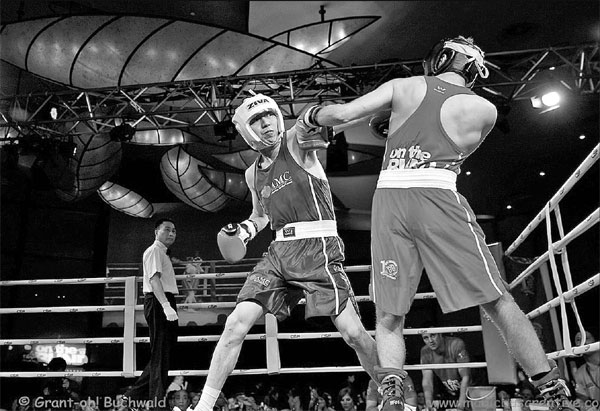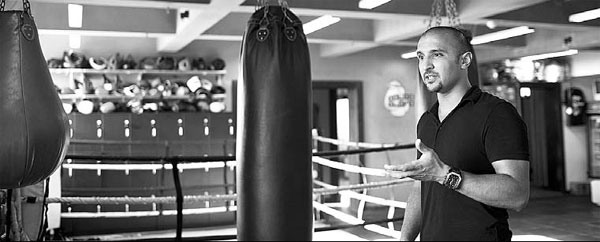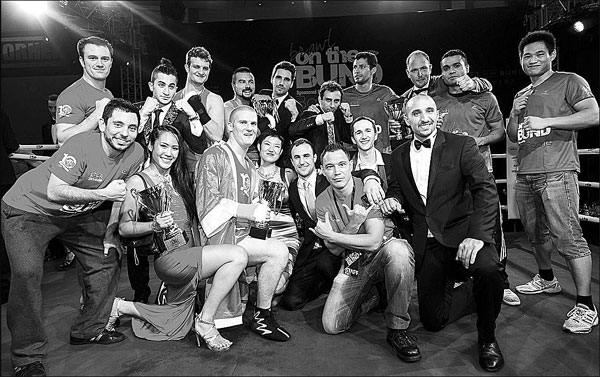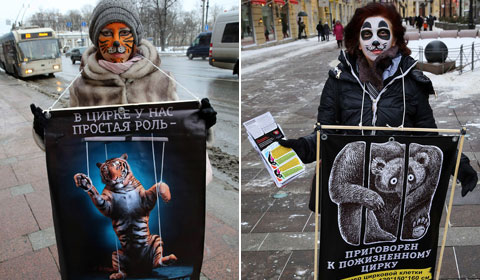Raging Dragon
Updated: 2014-02-06 14:47
By Liu Lu (China Daily USA)
|
|||||||||
Through his Shanghai gym and boxing events, Shane Benis hopes to popularize the sport he loves across China. He shares his ups and downs with Liu Lu.
When Shane Benis came to Shanghai eight years ago, he struggled to find a place to continue training in his chosen sport - boxing.
Three years on, the Englishman had not only found a way to keep training, but had begun taking the sport to the Shanghai public with a charity white-collar boxing event called Brawl On The Bund, which has since become a popular event on the city's social calendar.
Recognized today as one of the most active boxing promoters in China, Benis hopes to see the sport grow in popularity across the country and to see more Chinese boxers in international competitions.
|
The charity white-collar boxing event Brawl On The Bund, held twice yearly, has become a popular activity on the social calendar of Shanghai. Gao Erqiang / China Daily |
|
Shane Benis believes boxing has the potential to become a popular sport in China. Photos provided to China Daily |
|
Shane Benis is glad that Brawl on The Bund remains the boxing enthusiasts' focus in Shanghai. |
"Our goal is to share the sport of boxing in China and make it accessible for all," he says.
While it ranks far behind sports like football and table tennis in terms of popularity in China, boxing has begun to gain a following in recent years, according to Benis.
In 2011, Benis opened Golden Gloves boxing gym near People's Square in Shanghai to give the city's boxers a place to train. Today, this is where most of the Brawl On The Bund contenders train for about 12 weeks prior to the competition.
"Boxing is a fantastic stress release. Most of our members are business men and women looking to let off some steam and get fit," Benis says.
White-collar boxing refers to amateur boxing events in which participants are usually people from white-collar jobs and most contenders have no boxing experience prior to the competition.
"Everyone that takes part in white-collar boxing is an amateur with little or no boxing experience, which means anyone can take part," says Benis.
"It is a popular sport for business people to keep fit in the West. I want to introduce this sport to more Chinese and expats in China so as to provide them something new to experience after work."
The trainers at Golden Gloves are professional and amateur boxers from around the world, including Chris Xiong, who trained with the Chinese national team and Alfonso Cuadra, a former Golden Gloves National Champion of Mexico.
"We have people from all walks of life, such as bankers, executives and teachers, who train at our place. It is also a mix of different nationalities - Chinese, French, American, British, anyone you can think of."
To cater to a growing number of women interested in the sport, the gym also offers women-only classes.
"Half of our members at the gym are now women," he says. "The class does not allow men to take part so women can come into the gym and learn how to box, feeling secure. We focus on teaching the skills behind boxing and provide a heavy fitness element."
Despite a growing number of people training at the gym, Benis still feels it is a challenge to promote boxing in China.
"Like every sport in China, it just needs one key spark to create genuine interest around it," he says.
"Look at basketball - the Chinese have been crazy about it since Yao Ming was an NBA player. When Li Na won the French Open, Chinese people's interest in tennis soared, with participation of the grassroots and interest in watching tennis competitions rising.
"Boxing is also very popular around the world. All you need is a Chinese boxing star to do exactly the same thing. Once it happens, people will become more interested in boxing events. Therefore, the best way to promote boxing in China is by having key Chinese athletes representing China on a world stage."
Benis says China actually has some of the world's best amateur boxers.
"The Venetian in Macao and Top Rank Boxing are giving Chinese boxers the opportunity to shine on the world stage. Hopefully this will lead to interest in the sport in China, with more Chinese supporting Chinese boxers," he says.
Benis and his friends now aim to stage professionally promoted boxing events including Chinese and foreign boxers in China. But there are still a few hurdles to jump before they can do this.
"It's very important to get to know event operators and people familiar with the boxing scene in China. I work pretty closely with local boxing promoters and local representatives of the World Boxing Organization and the World Boxing Council," he says.
For now, the twice-yearly Brawl on The Bund remains the boxing enthusiasts' focus in terms of events. The competition raises money for Leo's Foundation, a charity set up to support a division of Fudan University Children's Hospital, which cares for prematurely born infants with respiratory failure. So far, the event has raised 1.2 million yuan ($196,080) for the foundation.
According to Benis, contenders in the events, who typically range between 20 and 50 years old, work in leading companies and undergo rigorous training for up to three months before fight night.
"The best equipment, coaching and refereeing are provided to ensure the participants' safety so both can return to the office the next day," he says.
"It's competitive but the guys are supposed to enjoy the experience whether they win or lose."
In 2012, Brawl on the Bund's sister competition Brawl on the Wall started in Beijing. This year, the event will take place in Beijing again in mid-November.
"It is very hard to prepare those events while having a full-time job of managing my family business of trading commodities and heavy machinery, but at the end when I see where the money goes to, it is all worth it," he says.
Contact the writer at liulu@chinadaily.com.cn.
(China Daily 02/06/2014 page12)
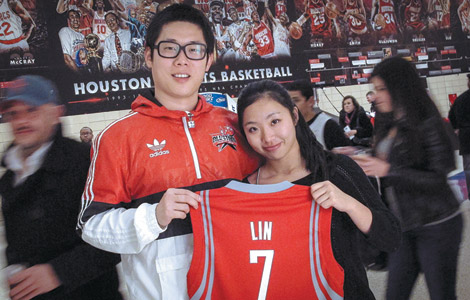
 Chinese Lunar New Year gift from abroad
Chinese Lunar New Year gift from abroad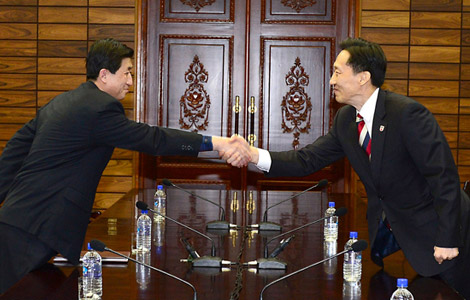
 Koreas reach out for family reunions
Koreas reach out for family reunions
 Storm to slam two-thirds of US
Storm to slam two-thirds of US
 Clowns gather for Joseph Grimaldi celebration
Clowns gather for Joseph Grimaldi celebration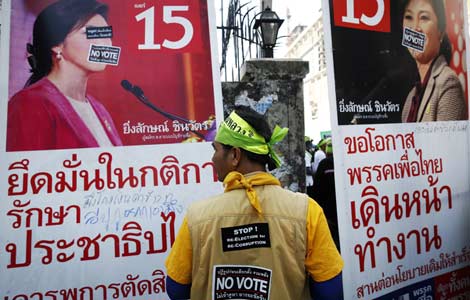
 Thai caretaker PM urges protesters not to block voting
Thai caretaker PM urges protesters not to block voting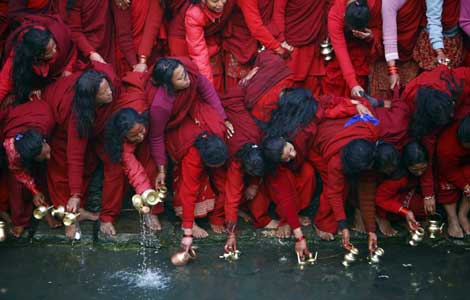
 Holy waters in Nepal
Holy waters in Nepal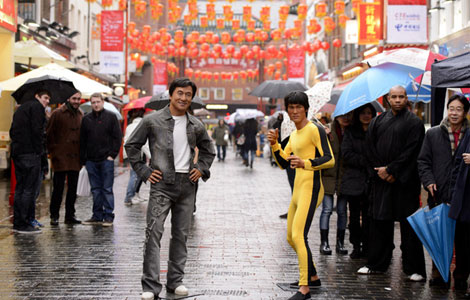
 Kongfu stars wax shine in London ChinaTown
Kongfu stars wax shine in London ChinaTown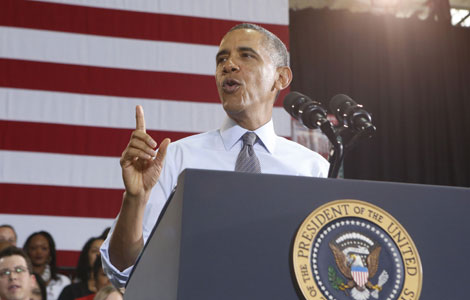
 Obama pushes minimum wage hike
Obama pushes minimum wage hike
Most Viewed
Editor's Picks

|

|
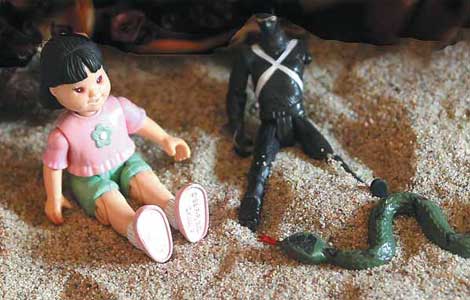
|

|

|

|
Today's Top News
Xi leaves for Sochi ceremony Thursday
China to bid on troubled Brazilian dam project
Flying Tigers denounce Abe's visit
China's oil demand is growing
Schroeder accuses US of disrespect
US criticism over ADIZ unfounded
US warns airlines about 'toothpaste bombs'
Family's murder leaves few clues
US Weekly

|

|
